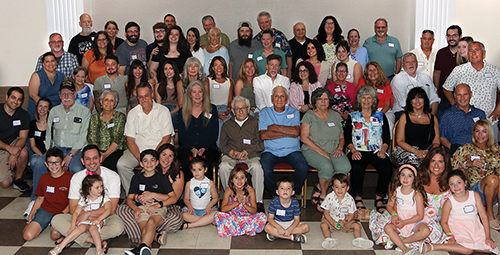Today’s Coronavirus News for New Jersey Business
June 6, 2020Senate Sends PPP Flexibility Bill to President
June 6, 2020The State We’re In by Michele S. Byers, Executive Director, New Jersey Conservation Foundation
When you think of farming in New Jersey, what comes to mind? Maybe huge rolling fields planted in rows of crops, or cows grazing in a pasture with a picturesque red barn?
New Jersey has lots of farms like those, but farming in the nation’s most densely populated state is so much more!
Picture this: a thriving farm in Trenton, created on a once-neglected, trash-strewn lot, now supplies fresh produce to a local soup kitchen; community gardens in Camden, Newark and other cities, where residents grow their own vegetables and build friendships with fellow gardeners; and farmers’ markets popping up in inner city neighborhoods with few supermarkets.
Such green oases are needed in our cities now more than ever, as urban and diverse populations have been especially hard hit by the health and economic impacts of COVID-19, and have long suffered disproportionate impacts of air pollution and environmental pollution.
Urban agriculture is growing in the Garden State, as increasing numbers of cities work to improve access to fresh, healthy foods. For decades, many urban residents have lived in “food deserts” without a supermarket within a mile of their home.
One exciting recent success story is Capital City Farm in Trenton, opened in 2016 on two acres in an industrial area. The abandoned property had been a dumping ground for debris over the years, but a partnership led by D&R Greenway Land Trust was formed, including Isles, Trenton Area Soup Kitchen, Rescue Mission and others who saw its potential and transformed it into a healthy green oasis.
Last year, Capital City Farm grew dozens of fruit and vegetable varieties, yielding more than 1,000 pounds of produce. More than 80 percent went to the Trenton Area Soup Kitchen, whose meals included daily fresh salads, and most of the rest was sold at a local farmers’ market.
This year is a challenging one for Capital City Farm, due to the COVID-19 crisis and a transition in management from D&R Greenway to a new nonprofit known as the Garden State Agrihood Project.
Because of the coronavirus pandemic and social distancing restrictions, Capital City Farm can’t depend on student interns and volunteers this summer to plant, tend and harvest crops.
“It’s been difficult but we’re still standing,” said board member Beth Feehan, who has taken on most of the day-to-day responsibilities of keeping the farm going. “This has to continue. Everyone deserves decent food.”
Thanks to a $20,000 grant from the Princeton Area Community Foundation secured by the New Jersey Conservation Foundation, the Garden State Agrihood Project has been able to hire contract employees to work on the farm.
Although Capital City Farm’s spring planting got off to a late start, Feehan said it turned out to be a blessing in disguise because of the killing frost in May that damaged crops at so many other New Jersey farms.
If all goes well this summer, Capital City Farm will continue to donate most of its produce to the Trenton Area Soup Kitchen – which, because of COVID-19, is now distributing packaged meals to go instead of hosting sit-down meals.
Feehan also hopes to establish a new farm stand this summer on part of the Capital City Farm property. And plans are under way to add heating to the farm’s large greenhouse so that food can be grown year-round.
Feehan said part of the Garden State Agrihood Project’s mission is to create entrepreneurial opportunities, like urban residents making food products with produce grown at Capital City Farm. “We might have someone who makes and sells their own tomato sauce with tomatoes grown at the farm,” she explained.
And as the pandemic has illustrated, said Feehan, urban communities can’t depend solely on large national and international food supply systems. There must be local and regional food systems in place as well. “This is a moment when agriculture is not just about rural farms,” she said.
Rutgers University Urban Extension & Engagement Research Associate Meredith Taylor added, “Rutgers has been working closely with urban farmers across the State. We hope to provide greater technical assistance and support, particularly to urban growers with entrepreneurial aspirations.”
Throughout New Jersey this summer and fall, New Jersey cities will be relying on urban farms, community gardens and farmers’ markets to supply fresh and healthy foods to residents.
New Jersey Conservation Foundation’s Jay Watson has been engaged in Capital City Farm from the beginning. “That space was successful even before the first tomato was picked,” he says, adding that “the benefits of reclaiming the space, engaging the community, hiring local residents and simply creating beauty has been immeasurable, especially at this complicated time in our history. It is a very special place.”
The Garden State has hundreds of urban farms, gardens and markets, including those run by the Greater Newark Conservancy, the Center for Environmental Transformation in Camden, Grow It Green Morristown, Isles in Trenton, and City Green in Paterson and Clifton.
To learn more about Capital City Farm and the Garden State Agrihood Project, go to https://thegsap.org/.
For more information about urban agriculture in other parts of the state, visit the Isles website at www.isles.org, Greater Newark Conservancy at www.citybloom.org, Center for Environmental Transformation at www.cfet.org, City Green at www.citygreenonline.org, and Grow It Green Morristown at www.growitgreenmorristown.org.
To find farmers’ markets and farm stands in New Jersey, go to the Jersey Fresh website at https://findjerseyfresh.com/explore/. Another listing of farmers’ markets can be found at the Edible Jersey website at https://ediblejersey.ediblecommunities.com/shop/new-jersey-farmers-market-guide.
And for more information about preserving New Jersey’s land and natural resources, visit the New Jersey Conservation Foundation website at www.njconservation.org or contact me at info@njconservation.org.




